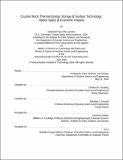Crushed rock thermal energy storage & nuclear technology : option space & economic impacts
Author(s)
McLauchlan, Nathaniel Ross
DownloadFull printable version (5.586Mb)
Other Contributors
Massachusetts Institute of Technology. Department of Nuclear Science and Engineering.
Advisor
Charles W. Forsberg.
Terms of use
Metadata
Show full item recordAbstract
Increasing amounts of intermittent renewables have led to zero and negative priced electricity at times of peak wind and solar production. The volatility added to the grid by renewables and low prices at peak production create a demand for flexible energy supply and present an opportunity for energy arbitrage. Nuclear reactors in the United States are inflexible when compared to fossil generators, and batteries may store energy at peak renewable production, albeit at a high capital cost. Thermal energy storage coupled to nuclear reactors may both increase nuclear flexibility and capitalize on price volatility, benefitting the economics for the struggling nuclear industry. This research maps the option space for constructing a crushed rock thermal energy storage (TES) system coupled to a light water reactor and employs a modification of the GenX capacity expansion model to evaluate the economic. Historic demand and renewable resource availability from ERCOT were used to illustrate the benefit of crushed rock TES with an increasingly restrictive CO₂ emission constraint. Parametric variations were used to address uncertainty in performance estimates. Crushed rock TES was found to be beneficial under favorable conditions, reducing the average price of electricity from $81/kWh (without TES) to $73/kWh (with TES) at a system marginal cost of $5/kWh-heat and emissions constraint of 100 g CO₂/kWh-electric, a nearly 10X reduction of current emissions. Unfavorable conditions resulted in a price reduction from $81/kWh to $78/kWh with the same cost estimates and carbon constraint. The investment cost of enabling the ability for nuclear generation to couple to crushed rock TES was also found to significantly affect the system's favorability and effect on electricity prices.
Description
Thesis: S.M. in Technology and Policy, Massachusetts Institute of Technology, School of Engineering, Institute for Data, Systems, and Society, 2018. Thesis: S.M., Massachusetts Institute of Technology, Department of Nuclear Science and Engineering, 2018. This electronic version was submitted by the student author. The certified thesis is available in the Institute Archives and Special Collections. Cataloged student-submitted from PDF version of thesis. Includes bibliographical references (pages 101-103).
Date issued
2018Department
Massachusetts Institute of Technology. Department of Nuclear Science and Engineering; Massachusetts Institute of Technology. Engineering Systems Division; Massachusetts Institute of Technology. Institute for Data, Systems, and SocietyPublisher
Massachusetts Institute of Technology
Keywords
Institute for Data, Systems, and Society., Engineering Systems Division., Technology and Policy Program., Nuclear Science and Engineering.